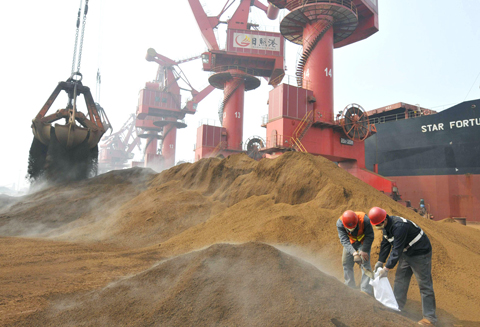Mining giant Rio Tinto announced a huge iron ore deal with China’s state-run Chinalco (中國鋁業) yesterday, days before four if its staff go on trial in a case that has threatened diplomatic and trade ties.
Rio said Chinalco signed a non-binding, US$1.35 billion deal to help develop a massive mine in Guinea, drawing a line under a period of turbulent relations with its biggest shareholder.
“We have long believed that Rio Tinto and Chinalco could work together on major projects for mutual benefit,” Rio chief executive Tom Albanese said.

PHOTO: REUTERS
The debt-strapped Anglo-Australian miner snubbed a US$19.5 billion cash injection from Chinalco last June, angering some Chinese commentators.
Weeks later, China’s spy agency swooped on Australian citizen Stern Hu (胡士泰) and three Chinese colleagues in Shanghai, prompting a rapid plunge in relations with Canberra and sending shudders through China’s foreign business community.
Hu, Wang Yong (王勇), Ge Minqiang (葛民強) and Liu Caikui (劉才魁) are scheduled for a three-day trial in Shanghai from Monday over alleged bribery and industrial espionage.
Australia yesterday insisted business with China, now its biggest trading partner, would not be harmed by the trial.
“The two matters are separate,” Trade Minister Simon Crean told public broadcaster ABC. “We are treating the Stern Hu case strictly as a consular case. We’ve never sought to make any link and neither have the Chinese in their discussions with us.”
However, Australian Prime Minister Kevin Rudd has already warned that the “world will be watching.”
Guinea’s Simandou mine, long mired by political upheaval, is described as the world’s best undeveloped source of high-grade iron ore, which is being consumed in vast quantities by industrializing China.
Analysts say the 110km seam could produce 200 million tonnes a year, matching Rio’s entire Western Australia Pilbara operation. Chinalco will acquire a 47 percent stake in the project.
“It’s a world-class monster. It’s a gorilla of a project,” James Wilson, a research analyst with stockbroker DJ Carmichael, said earlier this week.
Rio said the project, which involves building a mine, railway and port, would create tens of thousands of jobs in the country during construction and some 4,000 full-time posts when operations start.
“Chinalco brings its own skills and capabilities in major projects and access to the infrastructure expertise of other Chinese organizations,” Albanese said.

MORE VISITORS: The Tourism Administration said that it is seeing positive prospects in its efforts to expand the tourism market in North America and Europe Taiwan has been ranked as the cheapest place in the world to travel to this year, based on a list recommended by NerdWallet. The San Francisco-based personal finance company said that Taiwan topped the list of 16 nations it chose for budget travelers because US tourists do not need visas and travelers can easily have a good meal for less than US$10. A bus ride in Taipei costs just under US$0.50, while subway rides start at US$0.60, the firm said, adding that public transportation in Taiwan is easy to navigate. The firm also called Taiwan a “food lover’s paradise,” citing inexpensive breakfast stalls

TRADE: A mandatory declaration of origin for manufactured goods bound for the US is to take effect on May 7 to block China from exploiting Taiwan’s trade channels All products manufactured in Taiwan and exported to the US must include a signed declaration of origin starting on May 7, the Bureau of Foreign Trade announced yesterday. US President Donald Trump on April 2 imposed a 32 percent tariff on imports from Taiwan, but one week later announced a 90-day pause on its implementation. However, a universal 10 percent tariff was immediately applied to most imports from around the world. On April 12, the Trump administration further exempted computers, smartphones and semiconductors from the new tariffs. In response, President William Lai’s (賴清德) administration has introduced a series of countermeasures to support affected

CROSS-STRAIT: The vast majority of Taiwanese support maintaining the ‘status quo,’ while concern is rising about Beijing’s influence operations More than eight out of 10 Taiwanese reject Beijing’s “one country, two systems” framework for cross-strait relations, according to a survey released by the Mainland Affairs Council (MAC) on Thursday. The MAC’s latest quarterly survey found that 84.4 percent of respondents opposed Beijing’s “one country, two systems” formula for handling cross-strait relations — a figure consistent with past polling. Over the past three years, opposition to the framework has remained high, ranging from a low of 83.6 percent in April 2023 to a peak of 89.6 percent in April last year. In the most recent poll, 82.5 percent also rejected China’s

PLUGGING HOLES: The amendments would bring the legislation in line with systems found in other countries such as Japan and the US, Legislator Chen Kuan-ting said Democratic Progressive Party (DPP) Legislator Chen Kuan-ting (陳冠廷) has proposed amending national security legislation amid a spate of espionage cases. Potential gaps in security vetting procedures for personnel with access to sensitive information prompted him to propose the amendments, which would introduce changes to Article 14 of the Classified National Security Information Protection Act (國家機密保護法), Chen said yesterday. The proposal, which aims to enhance interagency vetting procedures and reduce the risk of classified information leaks, would establish a comprehensive security clearance system in Taiwan, he said. The amendment would require character and loyalty checks for civil servants and intelligence personnel prior to